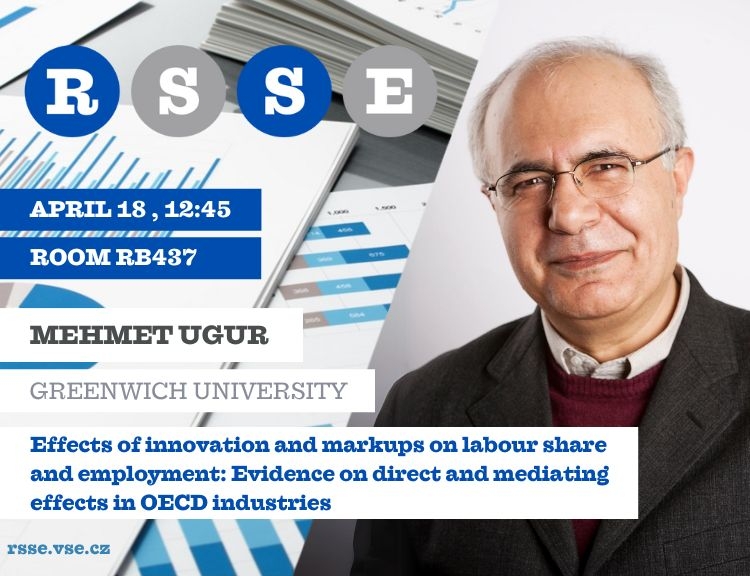Mehmet Ugur (Greenwich University) 18.4.2024
It is our pleasure that visiting professor Mehmet Ugur (Greenwich University)will present on Thursday, April 18, 2024, at 12:45 in room RB437 about the topic “Effects of innovation and markups on labour share and employment: Evidence on direct and mediating effects in OECD industries“.
Registration is not required and anyone who would like to attend is warmly invited.
It is also possible to participate online via MS Teams. To get access, please, contact lubomir.cingl@vse.cz.
ABSTRACT: This paper aims to address two issues that have been overlooked in empirical investigations of how technological innovation or market power affect labour share and employment. One issue is the lack of control for both innovation and market power at the same time. The other is disregarding the extent to which both determinants attenuate or exacerbate the effects of each other. I address both issues by drawing on first-order conditions from a constant elasticity of substitution (CES) production function and EU-KLEMS data on 32 industries in 12 OECD countries observed from 1995-2019. The findings indicate that: (i) the effects of market power on labour share and employment are always negative and large; (ii) the effects of technological innovation tend to be positive but small; and (iii) the adverse effect of market power is exacerbated by innovation, whereas the small but positive effect of innovation is attenuated and eventually offset as market power increases. Hence, we conclude that the main driver of the decline in labour share and/or employment is not technological innovation as such but the level of rents that innovating firms are able to extract. Our findings support calls for stronger labour-market institutions and competition policies that would reduce the wage and/or price wedges that firms exploit in imperfectly competitive markets.
BIO: Mehmet Ugur is a professor of Economics and Institutions at the University of Greenwich. His work focuses on the interactions between institutional quality, innovation policy, and economic outcomes such as firm dynamics, market power, income distribution, and employment. He has led research projects funded by the European Commission, the Department for International Development (DFID), and the Economic and Social Research Council (ESRC). Mehmet has a method specialism in meta-analysis, a quantitative method of evidence synthesis in economics and public policy. He is a member of the Meta-Analysis of Economic Research Network (MAER-Net); and has also acted as co-convenor for the Cochrane and Campbell Collaborations Economics Methods Group (CCEMG) from 2010-2015. Currently, he is Deputy Director of the Centre for Political Economy, Governance, Finance and Accountability (PEGFA) at the Greenwich Business School.
